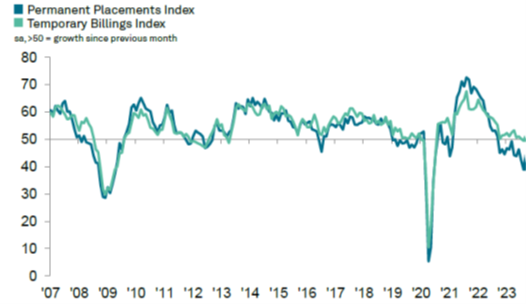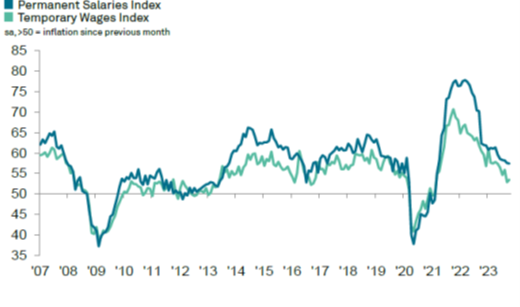Jo Thompson Recruitment contributes to the Report on Jobs, a comprehensive guide on the UK labour market that is drafted by KPMG and the Recruitment & Employment Confederation (REC), compiled by IHS Markit. The monthly report is built upon survey data from recruitment consultancies and employers, who share insights on the latest and most pressing labour market trends for the UK.
In the latest UK Report on Jobs, the REC, KPMG, and IHS Markit recorded a softer, but sustained fall in permanent staff appointments. Nevertheless, temp billings rise for second straight month and candidate availability expands at a sharper pace.
Commenting on the latest survey results, Claire Warnes, Partner, Skills and Productivity at KPMG UK, said:
“The jobs market is facing a cyclical challenge – there are people out there who want to work, and there’s a decent availability of candidates, but they often do not have the right skills for the roles on offer. This means higher starting salaries are still being offered as businesses compete in the ongoing battle for talent.
“And while the rate of decline in permanent placements is the weakest since June – this follows more than a year of cautious hiring due to economic uncertainty and means many businesses are unable to commit to long-term strategies and instead are having to focus on the here and now, by employing temps. The sharper rise in available candidates is good news for recruiters, but this comes at the expense of employers who are making more redundancies as they tighten budgets due to ongoing high inflation.
“Looking across sectors, healthcare as ever is experiencing a mismatch in supply and demand – there are fewer clinical professionals available to manage a very busy service as we head into winter. While permanent workers are the panacea, this is where temporary contracts continue to provide the means to deploy skilled staff at short notice, but at a higher cost.
“With a weak economic outlook for the months ahead, employers will be hoping next year will bring the expected easing of inflation so they can focus on delivering growth for their businesses.”
Neil Carberry, REC Chief Executive, said:
“In many ways, the labour market is marking time waiting for the brakes to be taken off growth by the Bank of England. While permanent hiring is now declining more softly, temporary hiring continues to pick up the slack – with billings gently growing for most of this year on the back of rising wages. While the rate of pay growth has now returned to more normal parameters, it is still strong, especially in sectors where staff remain in short supply. That sectoral split is ever more pronounced, with challenging sectors like construction and IT sitting in a very different place to hospitality and healthcare, which continue to be affected by shortages. Looking to the Autumn Statement, businesses and Government need to be aware that the return of growth will reveal shortages more widely – action on skills, welfare-to-work programmes and immigration reform will be needed to prevent a return to growth being squandered.”

Courtesy of IHS Markit, KPMG, and the Recruitment & Employment Confederation
Neil Carberry added:
“Healthcare providers are ramping up their hiring ahead of the winter, but candidate supply is short. Agency medical staff are keeping wards open and getting patients treated – they need a bit more support from Government. Reforming capped on-framework agency rates so pay for temps working on-framework can rise for the first time in four years will save Government money as they will end up using far fewer emergency shifts, and it will reward a part of the NHS workforce that is too often overlooked.”
Executive Summary
The Report on Jobs is unique in providing the most comprehensive guide to the UK labour market, drawing on original survey data provided by recruitment consultancies and employers to provide the first indication each month of labour market trends.
The main findings for October are:
Permanent placements fall at softest pace since June
The latest recruitment survey signalled that a cautious hiring environment persisted across the UK during October. Notably, uncertainty around the economic outlook contributed to the thirteenth successive monthly reduction in permanent staff hires, albeit with the rate of decline easing to the weakest since June. At the same time, there was a back-to-back rise in temp billings as some employers preferred the flexibility of short-term staff in the current climate.
Sharper rise in overall candidate supply
The availability of candidates improved for the eighth straight month in October, and at a much sharper rate than in September. This was due to an accelerated upturn in permanent candidate numbers, as temp staff supply rose at a slightly softer (but still marked) pace. There were frequent reports that redundancies and subdued hiring activity had contributed to the latest increase in staff availability.
Starting salary inflation slips to 31-month low
Permanent starters’ pay remained on an upward trend in October, though the rate of increase moderated to the weakest in just over two-and-a-half years. Nevertheless, the rate of salary inflation remained sharp and was in line with the series average. Recruiters often mentioned that employers had to up pay offers to secure suitably-skilled staff and to reflect the higher cost of living. Temp wages also increased, though the rate of growth held close to September’s recent low.
Demand for staff stabilises in October
Following a slight reduction in September, overall demand for staff stabilised in October. Underlying data highlighted that permanent vacancies fell only fractionally, while the number of temp positions increased modestly. That said, the latter marked the second-softest improvement in demand for short-term workers since January 2021.

Courtesy of IHS Markit, KPMG, and the Recruitment & Employment Confederation
Staff Availability
Stronger rise in overall candidate numbers
October survey data signalled that the overall availability of candidates increased for the eighth successive month. Notably, the respective seasonally adjusted index picked up from 55.5 in September to 59.0 in October, to indicate a sharp and accelerated rate of expansion. Data broken down by candidate type showed that both permanent and temporary worker availability improved sharply.
Permanent staff supply expands sharply in October
As has been the case since March, the availability of staff to fill permanent positions across the UK increased during October. Notably, the rate of expansion quickened to a rapid pace that was the third sharpest since December 2020. Recruiters frequently mentioned that staff supply had risen due to companies restructuring workforces and redundancies. There were also reports of some people seeking new roles due to concerns over job security or to source better-paid positions. All four monitored English regions registered steep upturns in permanent labour supply in October, with rates of expansion accelerating in all areas bar the North of England.
Further marked increase in availability of temp workers
Latest data pointed to a sustained rise in the number of temporary candidates across the UK at the start of the fourth quarter. Although the rate of increase edged down further from August’s 32-month record, it remained sharp overall. Where higher temporary labour supply was reported, panel members often linked this to company layoffs and fewer projects, partly due to pressure on client budgets. The rise in temporary candidate numbers was broad-based by English region, with the South of England noting the steepest rate of growth.
Pay Pressures
Starting salary inflation softens slightly again in October
Average starting pay for permanent staff continued to increase at the start of the final quarter of 2023. Though sharp and in line with the series average, the rate of inflation was the softest recorded in 31 months. Recruiters widely cited that competition for suitably skilled staff and the higher cost of living had placed further upward pressure on pay.
The quickest increase in starting salaries was seen in London, while the softest was registered in the South of England.
Temp pay growth holds close to September’s 31-month low
Recruitment consultants signalled a sustained rise in average hourly pay rates for short-term staff in October. Although solid, the rate of wage growth was only slightly stronger than September’s 31-month low and weaker than the series average.
According to anecdotal evidence, employers had increased temp pay to attract and secure suitable candidates. However, greater pressure on client budgets had weighed on overall growth. All four monitored English regions noted higher temp wages, led by the North of England.
At Jo Thompson Recruitment, we communicate seamlessly with hiring managers, fuel collaboration by sharing information and insights. Hiring managers are time-poor, so providing pre-qualified candidates with data driven insights and creating the resilient, agile and diverse workforce you need to succeed is a major win.
We can support you to refine your data-driven recruitment strategy and tailor your approach to each target audience. Help you make informed talent decisions around diversity and hidden talent pools. To discuss how Jo Thompson Recruitment can assist you with your resourcing needs, please email us at info@jtrltd.com or give us a call at 01635 918955 for further details.

